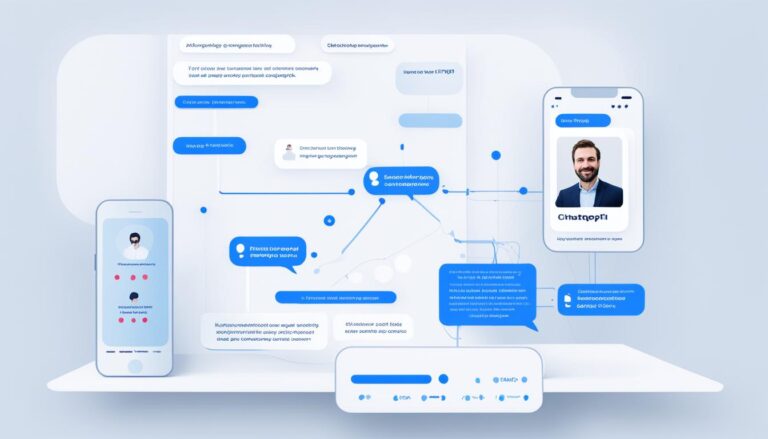Introduction
Artificial intelligence (AI) is rapidly transforming the financial industry. From chatbots that can answer customer questions to machine learning algorithms that can detect fraud, AI is being used to improve customer service, reduce costs, and increase efficiency.
In this blog post, we will explore the ways in which AI is being used in fintech and how it is changing the financial industry. We will also discuss the challenges and opportunities that AI presents for the financial industry.

The Rise of AI in Fintech
The symbiosis of AI and Fintech has been a product of their mutual aspiration to enhance customer experience, streamline operations, and fortify security measures. According to the “Global AI in Fintech Market” report by Markets and Markets, the AI in Fintech sector is projected to grow from USD 7.91 billion in 2021 to USD 22.6 billion by 2025, at a Compound Annual Growth Rate (CAGR) of 23.37%1.
| Year | Projected Market Size |
|---|---|
| 2021 | $7.91 billion |
| 2022 | $9.81 billion |
| 2023 | $12.10 billion |
| 2024 | $15.13 billion |
| 2025 | $22.6 billion |
Enhancing Customer Experience
AI-powered Fintech solutions help in understanding customer behavior by analyzing their transactions, interactions, and social media activity. For example, firms like Kabbage, an Atlanta-based online lending platform, employ AI and machine learning to provide real-time lending decisions to small businesses2.
Streamlining Operations
AI also boosts operational efficiency. Robo-advisors like Betterment and Wealthfront use algorithms to automate investment decisions, thereby reducing costs and human error3.
Fortifying Security Measures
Fraud detection and security are another crucial application of AI in Fintech. Mastercard’s Decision Intelligence uses AI technology to identify fraudulent transactions, thus enhancing the security of card transactions4.
How AI is being used in fintech
AI is being used in a variety of ways in the financial industry. Here are a few examples:
- Chatbots: Chatbots are computer programs that can simulate conversation with human users. They are often used in customer service applications, where they can answer customer questions and resolve issues. For example, Bank of America uses a chatbot called Erica to answer customer questions about their accounts and provide financial advice.
- Machine learning algorithms: Machine learning algorithms are used to analyze data and identify patterns. They can be used to detect fraud, predict customer behavior, and optimize financial products and services. For example, PayPal uses machine learning algorithms to detect fraudulent transactions.
- Big data analytics: Big data analytics is the process of analyzing large amounts of data to identify patterns and trends. It can be used to improve risk management, make better investment decisions, and develop new financial products and services. For example, BlackRock uses big data analytics to manage its $6.5 trillion in assets.
How AI is changing the financial industry
AI is changing the financial industry in a number of ways. Here are a few examples:
- Improving customer service: AI-powered chatbots can provide 24/7 customer service that is more efficient and cost-effective than traditional customer service channels. For example, ING Bank has seen a 30% decrease in call center volume since it implemented a chatbot.
- Reducing costs: AI can be used to automate tasks that are currently performed by humans, such as processing loans and claims. This can lead to significant cost savings for financial institutions. For example, Wells Fargo has saved $300 million by automating its loan underwriting process.
- Increasing efficiency: AI can be used to improve the efficiency of financial processes, such as risk management and compliance. This can lead to faster decision-making and better outcomes for customers. For example, Credit Suisse has used AI to reduce the time it takes to approve loans by 50%.
Case Study: Ant Financial
Ant Financial, an affiliate company of the Chinese Alibaba Group, serves as a powerful example of AI’s potential in Fintech. It has fully embraced AI technologies to improve and streamline its services.
One of Ant Financial’s standout innovations is its “310 Model“. This model (named for its promise of a 3-minute application process, 1-second loan distribution, and zero human intervention) has significantly improved loan processing efficiency and risk management1. It leverages machine learning algorithms and big data analytics to evaluate a client’s creditworthiness within seconds, making the loan approval process fast, easy, and more accurate.
Further, Ant Financial’s AI-powered chatbot customer service is another impressive development. Their virtual assistant, known as AliMe, assists users in handling financial transactions, answering queries, and even providing financial management tips2. Such capabilities are made possible by incorporating natural language processing (NLP) and machine learning techniques.
In addition to customer service and loan processing, Ant Financial has harnessed AI for fraud detection and prevention. Their AI system can identify abnormal patterns in transactions and flag them for further review, thereby enhancing security and reducing fraud risk3.
Through these AI-powered applications, Ant Financial has not only improved its own operations but has set a precedent for other Fintech firms on how to effectively utilize AI. This shows how AI, when implemented efficiently, can lead to enhanced customer service, improved financial management, and strengthened security.
Footnotes
- China Daily, “Ant Financial Services’ 310 Model” ↩
- South China Morning Post, “Ant Financial’s AliMe: more than just a customer chatbot” ↩
- Forbes, “How Ant Financial Uses AI To Prevent Fraud” ↩
Challenges and opportunities
AI presents both challenges and opportunities for the financial industry. Here are a few of the challenges:
- Data privacy: AI algorithms require large amounts of data to train and operate. This raises concerns about data privacy and security. For example, there have been concerns that AI algorithms could be used to discriminate against certain groups of people.
- Bias: AI algorithms can be biased, which can lead to unfair treatment of customers. For example, there have been cases where AI algorithms have been used to discriminate against people of color.
- Job displacement: AI could lead to job displacement in the financial industry, as tasks that are currently performed by humans are automated. For example, there have been reports that up to 40% of jobs in the financial industry could be automated by AI.
Despite these challenges, AI also presents a number of opportunities for the financial industry. Here are a few of the opportunities:
- New products and services: AI can be used to develop new financial products and services that meet the needs of customers. For example, AI-powered robo-advisors are becoming increasingly popular.
- Improved risk management: AI can be used to improve risk management and identify potential problems before they occur. For example, AI algorithms are being used to predict when customers are likely to default on their loans.
- Enhanced customer experience: AI can be used to enhance the customer experience by providing personalized service and recommendations. For example, AI-powered investment advisors can provide personalized investment advice based on a customer’s risk tolerance and investment goals.
The Future of AI in Fintech
While AI has already made significant strides in the Fintech sector, the future promises even more exciting developments. We’re on the cusp of seeing more personalized financial products, improved security, and efficient operations. As we embrace this future, we need to be cognizant of the ethical implications and the necessity of building AI systems that respect user privacy and autonomy.
Conclusion
AI’s integration into Fintech is just the beginning of a transformative journey that promises to revolutionize the financial industry. As these technologies continue to evolve, businesses that can effectively harness their power will undoubtedly lead the Fintech revolution.
AI is rapidly transforming the financial industry. It is being used to improve customer service, reduce costs, and increase efficiency. AI also presents a number of challenges, such as data privacy, bias, and job displacement. However, AI also presents a number of opportunities, such as new products and services, improved risk management, and enhanced customer experience.
The financial industry is at the forefront of the AI revolution. As AI continues to develop, it is likely to have an even greater impact on the financial industry.
Key Takeaways:
- AI is transforming the Fintech industry by enhancing customer experience, streamlining operations, and fortifying security measures
Footnotes
- Markets and Markets, “Artificial Intelligence in Fintech Market – Global Forecast to 2025” ↩
- Kabbage, “How Kabbage Defines the Future of Lending with Automated Decision Making” ↩
- Wealthfront, “Our Time-Tested Investing Approach” ↩
- Mastercard, “Mastercard Advances in AI with the Launch of Decision Intelligence” ↩
- China Daily, “Ant Financial Services’ 310 Model” ↩





